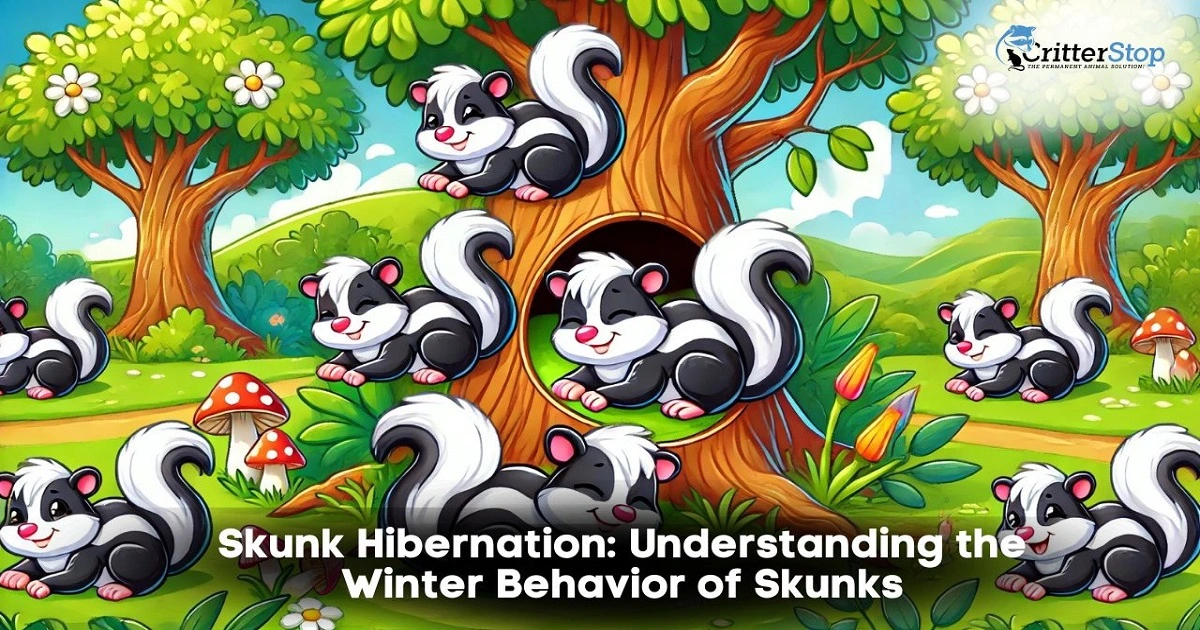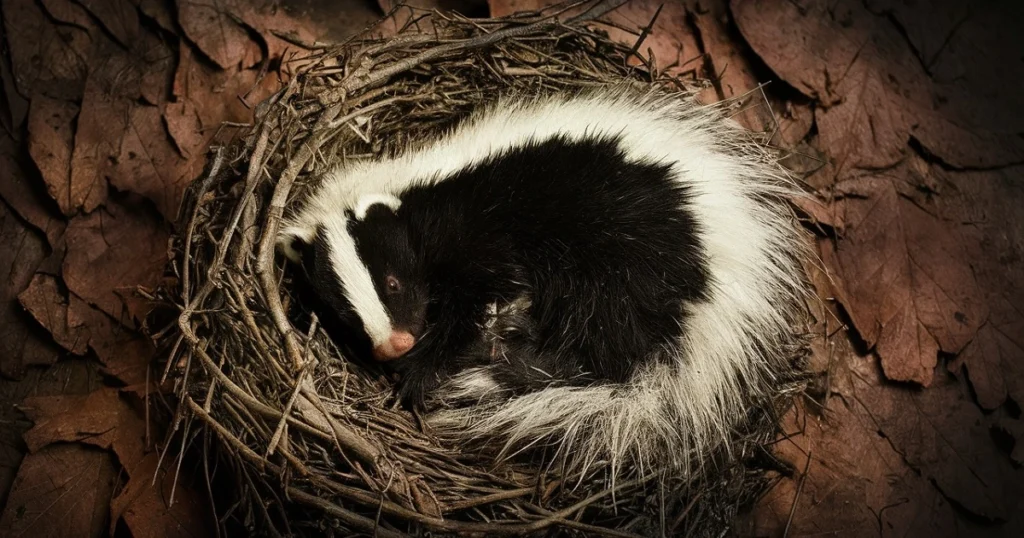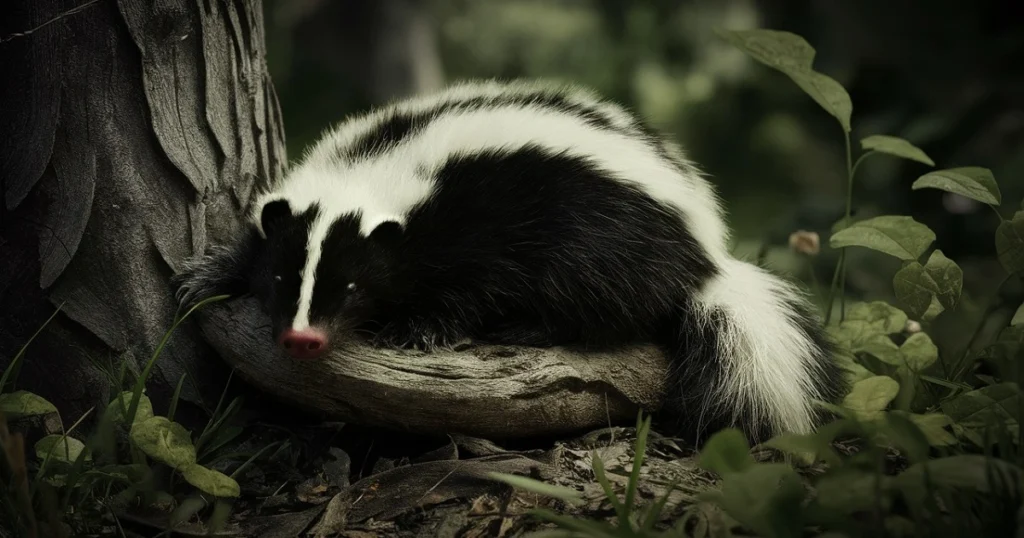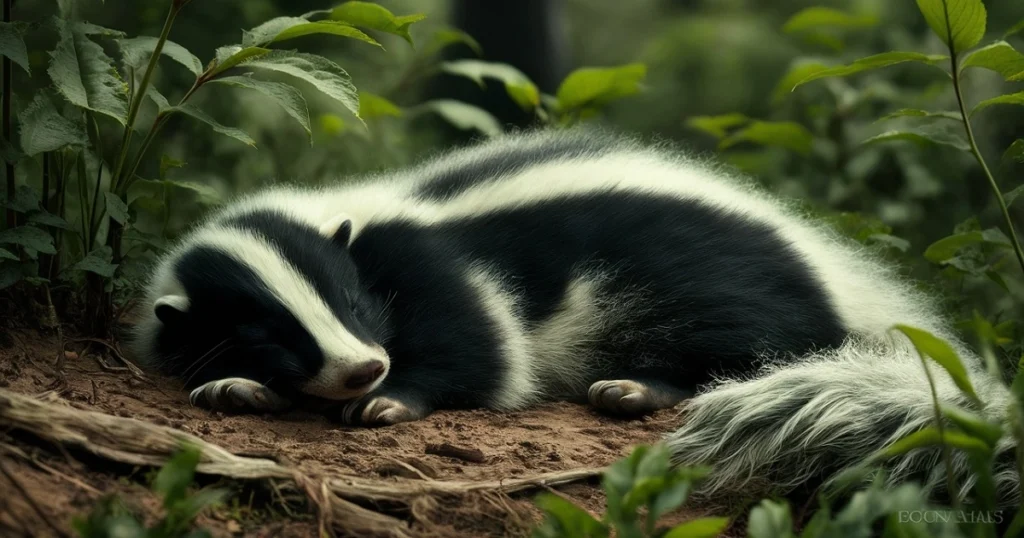
Skunks are fascinating creatures with unique behaviors that change with the seasons. As cold weather approaches, one common question arises: Do skunks hibernate? This comprehensive guide will delve into skunks' winter habits, explore whether they truly hibernate, and provide detailed insights into their survival strategies during the colder months.

To understand skunk behavior in winter, it's essential to distinguish between true hibernation and torpor. True hibernation involves a significant drop in body temperature and metabolic rate, with the animal remaining inactive for an extended period. Conversely, Torpor is a state of reduced physiological activity that allows animals to conserve energy while occasionally becoming active.
Skunks do not truly hibernate; instead, they enter a state of torpor. During this period, their body temperature and metabolic rate decrease, but they can wake up and become active if necessary. This adaptation allows skunks to survive harsh winter conditions while still being able to forage for food and avoid predators.
Skunks seek out sheltered dens during winter to protect themselves from the cold. These dens are typically located in:
Skunks may also create their burrows if no suitable options are available. These dens are lined with leaves, grass, and other insulating materials to help retain heat.
Skunks remain primarily nocturnal during the winter, but their activity levels decrease significantly. They will emerge from their dens on milder nights to forage for food. During extreme cold or heavy snowfall periods, skunks may remain in their dens for several days, relying on stored body fat for energy.
In winter, skunks' food sources become scarce, leading them to adapt their diet. While they primarily feed on insects, small mammals, and vegetation during the warmer months, winter forces them to rely on:
Skunks use their sense of smell to locate food, even under the snow. This foraging behavior is crucial for their survival during the colder months.

Skunks reduce their activity levels and enter periods of torpor to conserve energy during the winter. This strategy allows them to minimize energy expenditure while still being able to respond to environmental changes. By lowering their metabolic rate, skunks can survive on less food, making it easier to endure periods of scarcity.
Skunks are generally solitary animals, but they may den communally in winter to share body heat. This behavior is more common among females and their offspring. Communal denning helps skunks conserve energy and stay warm during extreme cold spells.
To prevent skunks from denning under your deck or porch, take the following precautions:
If you encounter a skunk during the winter, it's essential to remain calm and avoid startling the animal. Skunks will only spray as a last resort when they feel threatened. To minimize the risk of being sprayed:
Skunks play a vital role in maintaining a balanced ecosystem. By controlling insect and rodent populations, they help reduce the spread of diseases and damage to crops. Understanding their winter behavior can foster greater appreciation for these unique creatures and promote coexistence.
Pest control: Skunks help keep populations of harmful insects and rodents in check.
Soil aeration: Skunks contribute to soil health and aeration by digging for insects and grubs.
Seed dispersal: Skunks aid in the dispersal of seeds through their diet, promoting plant growth and diversity.
Many myths surround skunks, especially regarding their behavior during winter. Dispelling these misconceptions can help us better understand and coexist with these fascinating creatures.
Skunks play an essential role in the ecosystem, and supporting their conservation can benefit the environment. Here are some ways to help:

While skunks are intriguing animals, keeping them as pets is a controversial topic. Here are some considerations:
In many places, keeping skunks as pets is illegal. Always check local laws and regulations before considering a skunk as a pet. Even in areas where it is legal, obtaining the necessary permits and vaccinations is crucial.
Skunks have specific behavioral and care needs that can be challenging to meet in a domestic setting. They require ample space to dig and forage, a varied diet, and socialization. Skunks can also be destructive and may spray if they feel threatened.
Skunks can carry diseases such as rabies and leptospirosis, which can pose risks to humans and other pets. Regular veterinary care, including vaccinations and health check-ups, is essential for pet skunks.
Skunks are remarkable creatures with unique adaptations to survive in various environments. Understanding their behavior, especially during winter, can help us coexist peacefully and appreciate their role in the ecosystem. While they do not hibernate, skunks enter a state of torpor to conserve energy during the colder months. By taking preventive measures, such as sealing entry points and removing attractants, homeowners can reduce the likelihood of skunks denning on their property.
Skunks are valuable ecosystem members because they contribute to pest control, soil health, and biodiversity. By dispelling myths and raising awareness about their importance, we can support skunk conservation and promote a harmonious relationship between humans and wildlife.
Critter Stop offers expert services for those interested in wildlife and pest control solutions to address any issues you may encounter. With a commitment to high-quality work and excellent customer service, Critter Stop is the go-to solution for humane wildlife removal. Contact Critter Stop at (214) 234-2616 for a free inspection and effective pest control services. Critter Stop has a fantastic reputation and online customer reviews because it provides high-quality work and excellent customer service.
At Critter Stop, we aim to provide valuable insights into wildlife behavior to help homeowners in North Texas manage and coexist with local fauna. This FAQ section addresses common questions about skunk hibernation and their winter behavior.
Skunks do not truly hibernate but enter a state of torpor during the winter. Signs of skunk torpor in residential areas include reduced sightings of skunks, as they remain mostly inactive and sheltered in their dens. You might also notice less foraging activity and fewer disturbances around garbage bins or pet food areas. However, on milder nights, skunks may emerge briefly to search for food.
In winter, skunks prefer to sleep in sheltered, warm, and dry locations. They often seek out dens that protect them from the cold and predators. Common den sites include underground burrows, spaces under decks and porches, hollow logs, and brush piles. Skunks may also use abandoned burrows made by other animals like foxes or groundhogs.
No, not all species of skunks enter a state of torpor during the winter, and their behavior can vary by region and climate. While most skunks in colder areas will reduce their activity and enter torpor to conserve energy, skunks in warmer climates may remain active year-round. Understanding the specific behaviors of local skunk species is important to managing their presence effectively.
During winter, skunks rely on their keen sense of smell to locate food sources. They forage for rodents, small mammals, leftover fruits and vegetables, and human garbage. Skunks may dig through snow or debris to find food, and they are often attracted to easily accessible food sources around homes, such as pet food left outside or unsecured trash bins.
Skunks are less active in the snow than other wildlife due to their state of torpor. While animals like deer or rabbits remain active and forage regularly, skunks reduce their activity to conserve energy. They may come out of their dens on milder days to search for food but generally spend more time in their shelters. Their foraging behavior in snow involves digging and using their strong sense of smell to locate food.
Common challenges for skunk winter survival include finding adequate food sources, staying warm, and avoiding predators. The scarcity of food during winter months can make it difficult for skunks to sustain themselves. Harsh weather conditions and low temperatures can also threaten their survival. Skunks must also be cautious of predators while foraging and seek safe, insulated dens to protect themselves from the elements.
For expert assistance with skunk management and other wildlife concerns, contact Critter Stop at (214) 234-2616. We offer free inspections and humane removal services to address your property's wildlife or pest issues. Critter Stop has a fantastic reputation and online customer reviews because it provides high-quality work and great customer service.
Visit our Critter Library and learn more about our furry friends